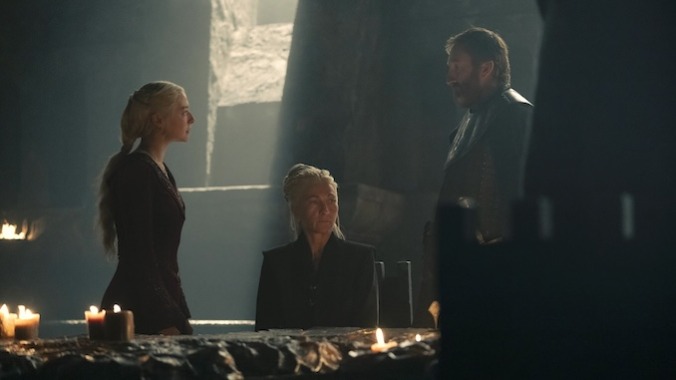2024 Is the Year of Royal Court Drama
Arguing-in-rooms television is so back
Photo Courtesy of HBO
It’s both comforting and a little depressing to realize that, for all the boundary-pushing, budget-raising expansions of the television medium over the past few decades, we haven’t really found a more compelling font of drama than two people standing in a room arguing about their conflicting desires. Sure, you can reduce nearly all scripted media to this watered-down description of the basic function of drama, but if Succession—one of the best received television shows of late—has proven anything, it’s that audiences want to see people with power argue about who deserves it more.
To promote the premiere of House of the Dragon Season 2, the social media accounts for various HBO and Warner Bros. properties announced their fealty to Rhaenyra (#TeamBlack) or Alicent (#TeamGreen). It should come to no surprise that House Roy swore allegiance to Team Green, as both shows are about the same thing: slighted heirs revolting against a more sensible, if dubious, consolidation of power. At the end of the day, audiences are still willing to turn up to the courts of kings and queens, where vices overpower righteousness, and pick sides.
If Succession is about a modern day “royal court,” 2024 has already offered an embarrassment of historical riches. Mary & George at Starz was an erotically-charged, venom-tongued look at the schemers for King James I’s favor. FX’s Shōgun intricately assembled a dynasty in a feuding feudal Japan. House of the Dragon may not have actually happened, but rarely have we been invited so closely into the war rooms of Westeros as these two seasons have given us. (To be honest, your average TV viewer knows more about these fictional families than real monarchs.)
In the opening four episodes that have screened for critics, Alicent and Rhaenrya’s forces argue amongst themselves in council chambers and intimate asides. In the series, the “Dance of the Dragons” civil war is triggered by moments of explosive violence but can be best understood as the manifestation of an adolescence spent watching divisions sprout between those you trusted and coping with alliances with those who mean nothing to you.
It’s a show about resentment and betrayal, but on a smaller scale than the outbursts and violence would let you believe. It reveals the pettiness of ruling Westeros to a far deeper degree than Game of Thrones, where complacency with power and insecurity over legacy turns you into someone you might never have been if you weren’t in the spotlight. This means there are plenty of scenes of learned advisors schooling impetuous youth and heirs stomping their feet and protesting that nothing’s fair. Everyone’s a giant baby and a raging sociopath at the same time, and it’s thrilling, delicious stuff.
It’s also a brilliant case study for why the court drama (we’re using the term to refer to the court of a king or queen rather than the legal area of Presumed Innocent or the athletic domain of Challengers…) is so delightful. We get to indulge in a fantasy of power and honor while also taking full advantage of the distance between the television and the couch we’re watching it from. We are permitted to lean in and lean back from the excitement and folly of the royal court at the same time; even though these elites hold more power than everyone else in the show, they’re no match for the judgment of the ultimate overseeing voyeur: the viewer.
It’s also noteworthy that all the court dramas we’ve seen this year have boosted prestige-sized budgets, starry casts, and plenty of detailed effects. Period dramas are always more likely to be pricey event television rather than soaps or procedurals, but the type of drama that excites us most in House of the Dragon and Shōgun is inexpensive.
-

-

-

-

-

-

-

-

-

-

-

-

-

-

-

-

-

-

-

-

-

-

-

-

-

-

-

-

-

-

-

-

-

-

-

-

-

-

-

-








































